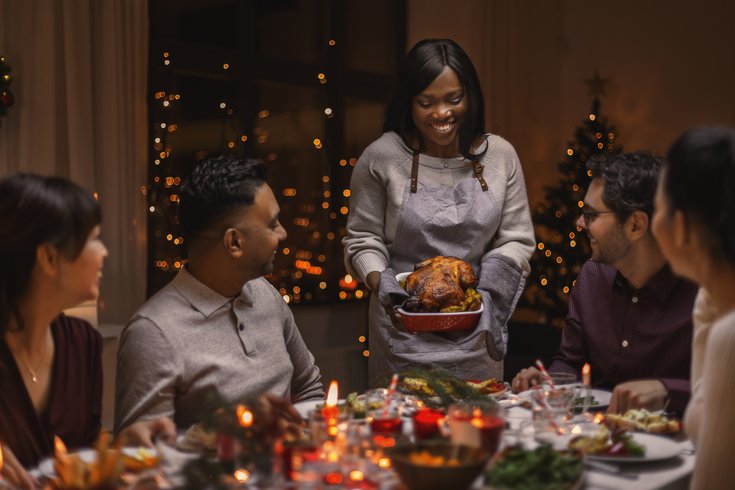
November 17, 2023
 Source/Image licensed from Ingram Image
Source/Image licensed from Ingram Image
The holidays make a great time for men to lay the foundation for a healthy lifestyle. Social gatherings showcase one of the motivating factors for adopting healthy habits – to enjoy cherished relationships for years to come.
If the upcoming holiday season prompts thoughts of "Groundhog Day" and repeated rituals of eating and drinking too much, think again. This need not be the case.
Yes, tradition gives us a hall pass on unhealthy behaviors and somehow justifies overindulgence, but maybe it’s time to turn down that pass. There’s a flip side to consider.
The holidays bring our most cherished relationships, our motivation for living a long and vibrant life, front and center. A man’s “why” for the sacrifice and commitment to a healthy lifestyle is embodied in the same gatherings that present the temptations to be avoided. The greatest gift you could give to yourself, and the people who want you actively in their lives for years to come, is a new mindset that sees the holidays as a launching pad to a life of health and happiness.
To do this you’ll need to mentally undo the masculine holiday mindset, employ strategies that protect you from seasonal pitfalls, and stay active. By conquering the habitual default to unsound practices, you’ll finish the year strong and catapult yourself into 2024 with the momentum to permanently instill a lifestyle that provides the fulfillment and happiness that is the essence of life.
For men, particularly 50-plusers entrenched in holiday traditions, the turnaround begins with a new mindset, one that rejects the social norms that have influenced us since we were kids. It’s not easy, but it's a necessary part of the foundation needed to sustain habits over the long run.
One of the most common masculine traditions is alcohol consumption. The American Psychological Association reports that men typically engage in more general and heavy alcohol use than women, and the medical journal Drugs: Education, Prevention and Policy echoes this point, noting that intoxication from alcohol has long been associated with men and masculinity. To drink is to be masculine in many cultures, with heavily drinking and intoxication considered even more masculine.
Diving a little deeper, Harvard Medical School cites findings that show the average adult consumes three alcoholic drinks daily during the holidays, and other research that shows just one daily drink may raise a person's risk of cardiovascular disease. Harvard also reminds us of the extra calories to consider, which can range from 120 to more than 200, depending on the beverage.
Now, U.S. Dietary Guidelines define moderate drinking for men as two drinks (any type) per day, so total abstinence is not the benchmark. Progress, not perfection, is the goal. Many experts suggest the use of sparkling water or low-sugar juice as a substitute or supplement to keep one's drinking in the moderate range.
University of Pittsburgh Medical Center recommends proportion size as a personal tactic to manage the volume of food and meal choices you’ll encounter. By taking smaller portions of several foods and going back for a little more as desired, you can manage that buffet just fine. For more formal meals, UPMC recommends a smaller plate to ensure proper portion sizes and suggests that you don’t have to eat everything that is served. It's OK to skip those dinner rolls.
Commenting on the inclination to order takeout during the holidays, the Mayo Clinic suggests that it's best to avoid the temptation. Homemade meals with healthy ingredients like fresh or frozen fruits and vegetables, lean meats, fish, seafood, eggs and low-fat dairy can help you maintain good practices.
For appetite control, Mayo highlights the benefits of a balanced breakfast and studies that show people who eat balanced meals throughout the day have a higher metabolism and better appetite control. And the American Council on Exercise stresses the importance of staying hydrated and drinking water when you feel hungry between meals.
Another strategy promoted by experts is socialization away from the food. St. Joseph’s Medical Center in Houston recommends that you literally move away from the food if you’re talking at a party so you’ll be less likely to spot something irresistible. It also suggests planning new holiday activities that don’t involve food but still provide socialization with loved ones. Walks, outdoor activities in the yard or even board games are on the checklist of alternatives.
The U.S. Centers for Disease Control and Prevention promotes other activities that don’t involve eating, like volunteering or visiting a museum. And let’s remember that it is not mandatory to consume large quantities of food and drink when watching sports on television. This is where moderation really comes into play.
The University of Wisconsin School of Medicine and Public Health tells us that maintaining physical activity will help one stay healthy and energetic and improves one's mood. If you’ve got the ability to maintain your regimen, keep it up. If you’re looking for an exercise substitute or new ways to keep active, try physical-activity-centered plans like a light walk, or a ski or ice-skating outing.
If you are up for it, you might even join some local kids – or your grandchildren – in sledding, ice skating or tossing snowballs to get the blood flowing and build bonds.
If you really want to pamper yourself this holiday season and get a leg up on your healthy behaviors in 2024, then consider scheduling your annual physical over the next 6 weeks, or maybe consult with a registered dietician who can tailor a dietary program to your individual needs. You may not consider this pampering in the traditional sense, but it’s a great way to redefine the idea.
The holidays conjure up memories of the past and there’s a natural inclination to repeat what you’ve always done. It takes a conscious effort to modify those habits and establish new ones that tweak the holiday script.
Make it a point this year to stop the unconscious repetition of overindulgence. Move yourself in a new, positive direction that sets you on a healthy journey while preserving the social connections that reinforce your love for those around you. By embracing change, you’ll give yourself and your loved ones the greatest gift of all.
Louis Bezich, senior vice president and chief administrative officer at Cooper University Health Care, is author of "Crack The Code: 10 Proven Secrets that Motivate Healthy Behavior and Inspire Fulfillment in Men Over 50." Read more from Louis on his website.